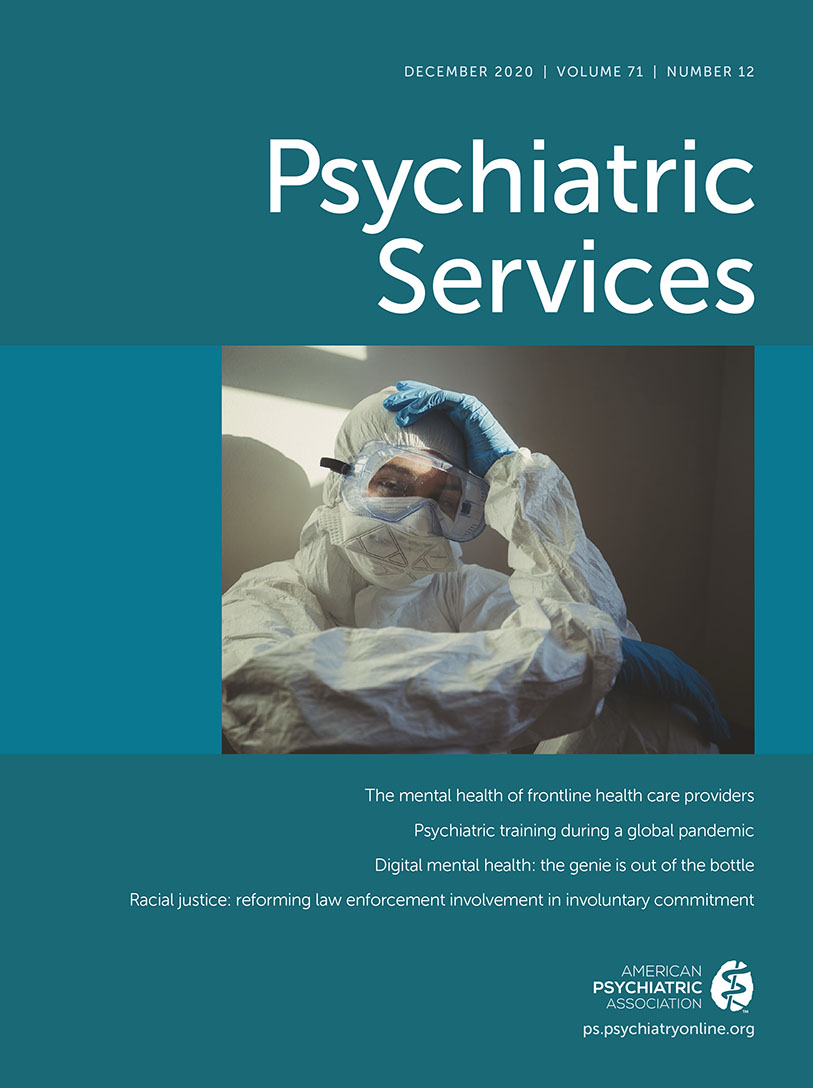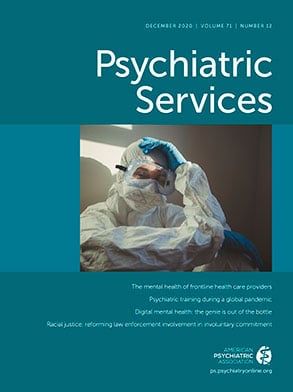In 1970, the federal government of the United States passed the Controlled Substances Act, which categorized lysergic acid diethylamide (LSD) as a Schedule I drug with no recognized medical uses. This decision signaled the cessation of legal research into the use of LSD and other psychedelic compounds for treating psychiatric maladies; up until that time, such research had been thriving. Today, there is renewed research interest in the use of psychedelic substances for the treatment of conditions such as terminal illness–related anxiety and treatment-resistant depression (
1). In 2019, two cities in the United States decriminalized the possession of certain psychedelic compounds. In May 2019, the citizens of Denver passed a city ordinance to decriminalize mushrooms containing psilocybin (
2). One month later, the city council of Oakland, California, unanimously voted to decriminalize “entheogenic plants” containing psilocybin, mescaline, or dimethyltryptamine (
3). In early 2020, the American Psychiatric Association issued a review of psychedelic therapies indicating that, despite insufficient research to support U.S. Food and Drug Administration (FDA) approval of any psychedelics at that point, continued study of the efficacy of psychedelics for mental disorders was warranted (
4). The convergence of new research demonstrating psychotherapeutic benefits from psychedelic compounds and a relaxation of political concern about them suggests that psychedelics may soon become viable medicinal treatments. This Open Forum describes psychiatrists’ necessary role in psychedelic treatment, recommends guidelines for safe distribution and administration, and addresses areas of special concern, including the management of adverse events, informed consent, and the practical aspects of conducting psychedelic-assisted psychotherapy.
Psychiatrists’ Role in Psychedelic Treatment
If psychedelic drugs become approved as treatment modalities, psychiatrists should be responsible for their prescription and the management of patients receiving them First, research on the psychotherapeutic potential of psychedelic compounds has focused on psychiatric conditions, including terminal illness–related anxiety, treatment-resistant depression, and substance use disorders. Because psychiatrists are medical professionals with expertise in the evaluation and management of mental disorders, they are best suited to understand when novel treatments may be appropriate for patients with such conditions. Similarly, psychiatrists are necessary to assess patients for comorbid conditions that may make psychedelic therapy riskier. Concerns about the exacerbation or unmasking of bipolar or psychotic disorders have prompted some researchers to exclude patients with a personal history—or a first- or second-degree relative with a history—of bipolar disorder I, bipolar disorder II, schizophrenia, and other psychotic disorders from participating in studies evaluating the psychotherapeutic benefits of psychedelics (
5). Thus, rational prescribing would consider the potential risk factors for individuals having a “challenging experience” (previously referred to as a “bad trip”) or undergoing potentially irreversible psychological harm.
Second, the prescription and administration of psychedelic drugs may cause significant adverse medical effects. Psychedelic compounds exert their effects through the 5-HT2A receptor, which also mediates smooth muscle contraction, platelet aggregation, and coronary artery spasm. Case reports have documented individuals suffering from rhabdomyolysis with subsequent acute rental failure from the use of psilocybin as well as rhabdomyolysis and limb ischemia from the use of LSD (
6). More commonly, however, psychedelic substance use may result in acute or chronic adverse psychological or behavioral effects. In a study of nearly 2,000 individuals with a history of psilocybin use and a prior “challenging experience,” 10.7% reported putting themselves or others at risk of physical harm, 2.6% reported behaving in physically aggressive or violent ways, and 2.7% reported seeking medical attention at a hospital during the experience. Of those whose session occurred over 1 year before the survey, 7.6% sought treatment for enduring psychological symptoms that they attributed to the psilocybin session, which included persistent fear, anxiety, paranoia, and depression (
7). Although acute and persistent negative behavioral or psychological outcomes are less common when psychedelic sessions are conducted in a controlled, monitored setting, they nevertheless may occur. Psychiatrists are unique in their ability to assess both medical and psychiatric adverse effects from psychedelic treatments and to manage acutely distressed, agitated, or violent patients with nonpharmacological or pharmacological approaches.
Informed Consent
Psychedelic compounds have wide-ranging effects on human consciousness. Although their effects are not entirely dose dependent, low doses tend to cause altered special sense perception and synesthesia. With increasing doses, individuals may experience derealization, depersonalization, and completely altered consciousness, including loss of time and space perception, transcendent experiences, encounters with otherworldly beings, and the dissolution of one’s sense of self, also known as ego death (
8). As described earlier, psychedelics may also cause medical or psychological adverse effects. For these reasons, clinicians utilizing such treatments must engage patients in a thorough informed consent procedure. Patients should have a detailed understanding of their potential reactions to the psychedelic substance. Although it is impossible to know exactly what will occur in a session, psychiatrists should inform patients that they may experience altered sensory perception, impaired logic, and distorted or reduced awareness of time, place, or self. Given psychedelics’ stigmatization as a potential mechanism for “mind control,” resulting largely from governmental experimentation with the compounds, ethical practice will require psychiatrists to be as informative and transparent with patients as possible regarding psychedelic effects before their administration. Prudent practitioners should also review patients’ spiritual or religious backgrounds and beliefs, which may play a role in the content that arises during a psychedelic session.
Because of the potential for psychedelic drugs to disrupt the logic of one’s thought process, patients may lose the capacity to understand information provided to them or to rationally manipulate information to make a medical decision during a session. Therefore, the informed consent procedure conducted before the session must establish a patient’s wishes in certain scenarios that may arise. For example, patients should state whether they will allow physical touch if experiencing emotional distress during a session. Patients should understand that they may become a risk of harm to themselves or others (e.g., because of paranoia, agitation, or efforts to move while disoriented). Patients should know that, in such cases, they may not have the capacity to refuse efforts to reduce the risk of harm (e.g., restraint or, less likely, the application of a sedative). Establishing the patient’s preferences and educating the patient about the risk of adverse events before the session are necessary to reduce the risk of unexpected outcomes and claims of malpractice or battery.
A Model for Psychedelic Administration
If psychedelic drugs become reclassified and approved for the treatment of mental disorders, psychiatrists should encourage the development of a rational model for their dispensation and administration. Although psychedelics have significantly less potential for abuse than other scheduled substances, such as cannabis and opioids (
9), their effects are often unpredictable and can severely impair users, especially in nonclinical settings. Therefore, psychedelic administration should be relegated to clinical settings, where patients can be monitored closely to assess their response to the treatment and any adverse effects, as is recommended with intranasal esketamine.
The current models of psychedelic-assisted psychotherapy typically describe a multisession treatment sequence including preparation; drug administration; and “integration,” or therapy that focuses on the experiences that arose while intoxicated with the psychedelic to help clarify their meaning for the individual (
10). Beginning with Timothy Leary in the 1960s, researchers have recognized that the psychedelic user’s expectations or previous experiences (or mental “set”) and aspects of the physical environment (or “setting”) could have a significant effect on the psychedelic experience (
11). Psychedelic sessions are typically conducted in comfortable rooms with a reclining chair or bed. Music and eyeshades are available, along with sipping water and receptacles in case of nausea and vomiting. Psychiatrists offering psychedelic treatments should adhere to such models for the setting, because standard clinic or laboratory rooms may feel unfamiliar during the session.
High-dose psychedelic sessions may last 6 hours or longer, depending on the substance consumed. A therapist or “guide” is usually present to assist the patient in exploring the experiences that surface during the session as well as to address any discomfort or other adverse events that may arise. Self-styled psychedelic guides have written extensively about their experiences with patients and how to establish a safe, open, trusting environment for patients to be able to benefit from psychedelic journeys (
12,
13). Organizations have also developed training sessions and recommendations to assist potential psychedelic-session therapists or guides. For example, the Council on Spiritual Practices established ethical guidelines for spiritual guides who conduct psychedelic sessions (
14), and the Zendo Project associated with the Multidisciplinary Association for Psychedelic Studies instituted psychedelic peer support training to reduce harm for individuals with challenging experiences while intoxicated (
15). Because of time and financial pressures, psychiatrists are unlikely to serve as the therapist or guide for an entire psychedelic session. Other mental health professionals with experience or training in working with patients in altered states of consciousness will likely fill this role under the supervision of psychiatrists. Because of the requirements of psychedelic-assisted therapy described earlier, specialized clinicals will likely be needed for administration. The average community practitioner should be aware of psychedelics as potential treatment options and refer their patients, when appropriate, to a specialty psychedelic clinic.

